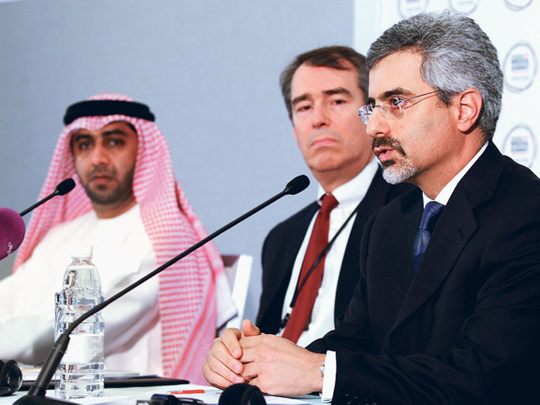
Abu Dhabi: Broadband users across the Middle East and North Africa (Mena) region are estimated to go up by approximately 40 per cent by 2015 and will open up a revenue base close to $600 million (Dh2.2 billion), a communication, media and technology expert said during the Abu Dhabi 2010 Media Summit press briefing yesterday.
The 2010 broadband usage is close to 15 per cent among 300-350 million inhabitants across the Mena region, a market that is comparable to the size of the US.
During the first three-day Abu Dhabi Media Summit (ADMS), which started yesterday, Booz and Company vice-president and an acclaimed expert on the communications, media and technology scene, Karim Sabbagh, spoke about the importance of aggregating capability for print, audio and digital media players.
"Up to 36 per cent of users and viewers spend their time watching television today, and close to 70 per cent spend time on the internet. This tells us where our listeners are going to be, and where we need to start making significant headway. This doesn't mean traditional media will take a back seat, it just means new media will be as important," said Sabbagh.
New dialects
With up to 35 Arabic dialects across the Mena region, the platform to combine both traditional and modern media will become easier, said Sabbagh. "We're pretty much at the start gate of the digital world, the next three days will explore how we can go about it," he added.
Ahmad Bin Ali, senior vice-president, corporate communications, at etisalat, highlighted the importance of continuous engagement between the telecom industry and the media.
Increasing convergence
"Today we can view, hear and read virtually anything, anywhere, anytime. We can also see an increasing convergence between telecoms and media, and there are already many similarities in the services offered, such as breaking news, videos, music and ring tones. The old definitions that provided separation between radio, TV, cable, newspapers, and film have gone, or are going forever," said Bin Ali.
Over the course of ADMS, 400 chairmen, CEOs, and heads of major business houses are expected to discuss the enormous growth forecast in emerging markets for multimedia services and future TV trends, some of which will include mobile TV, in addition to convergence and its impact on modern society.
"The internet has recently changed our favourite delivery systems, newspapers now provide video, TV offers interactive chat, and radio has web-cams. These changes represent a seismic shift in the way we view and communicate. Earlier you would wait for a specific time of the day to watch the news or your favourite programme on the television, but today they are recorded for your automatically across multiple channels, or you can tune into in-depth reports via IPTV," Bin Ali said.
Speaking about the print industry, Edward Borgerding, chief executive officer at the Abu Dhabi Media Company, explained that the Mena region is not under as much pressure as some other markets across the world, such as the US, are experiencing.
"But in some point of time, whether it's in five, ten, or twenty years, the newspaper business and the print media, will start to suffer from head winds that the rest of the world is currently experiencing, he said, adding that this gives the Mena region enough time to observe and learn from other markets.
On the agenda
- The three-day invite-only summit (March 9 to 11) features a combination of high profile public sessions, closed-door discussions and private conversations, bringing together top-tier global media players, and their emerging market counterparts
- Targeted sectors include mobile, broadband, traditional television, print, entertainment, news, music, advertising and marketing, venture capital and equity finance, with special emphasis on markets in the Middle East, the subcontinent, East Asia and China.
- A three-year contract has been signed to run the ADMS each year.
outlook
top takes
n Dr Prannoy Roy - Executive Chairperson, NDTV
"The Abu Dhabi Summit comes at the right time — media is set to grow rapidly in developing countries and an exchange of ideas with the developed world will be most productive."
n Hans Vestberg - President and CEO, Ericsson
"Technology is advancing at an astonishing rate across, shaping both media and societal change. I'm delighted to be a co-chair of the Abu Dhabi Media Summit, which I believe will be a meeting of minds that looks to become a crucial event in the media industry calendar."
n Dr Suk Chae-Lee, CEO, KT Corporation
"This summit will be a great opportunity to bring insight into the future of media and telecommunication industries."
n Mohammad Omran, Chairperson, Etisalat
"Forums such as the Abu Dhabi Media Summit are very important and we actively participate in order to engage with the industry. The convergence of technology and media is one of the telecom sector's unstoppable trends and this is why we are investing in our network to help service our client's needs through providing access to rich content.
n Mehmet Ali Yalcindag, CEO and Vice-Chairman, Dogan Media Group
"I believe that in this ever growing world, a meeting of this calibre helps to bring together people who share the same interests; who try to steer their ships to safe harbors in these troublesome seas."











